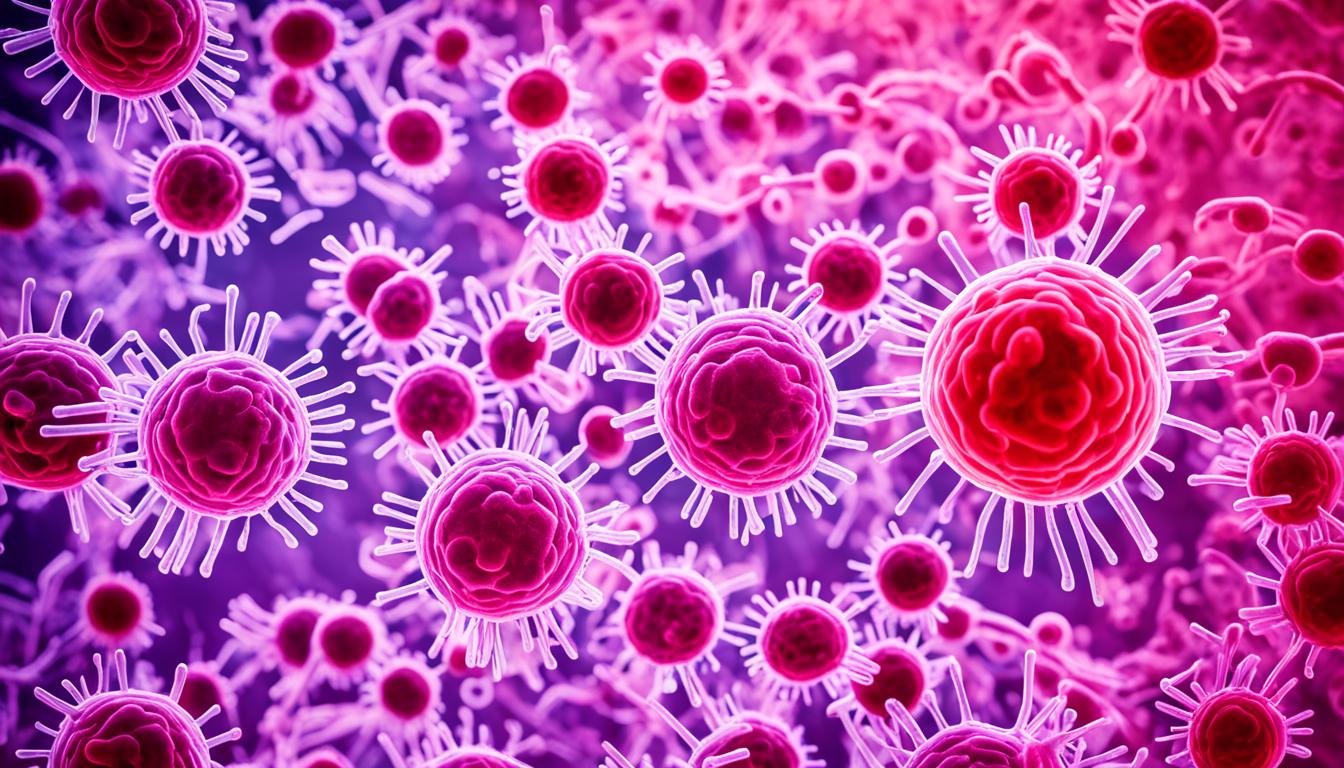Chlamydia is a common sexually transmitted disease. It’s caused by the bacteria Chlamydia trachomatis. The disease affects about 129 million people worldwide. It’s a serious health issue because many don’t show symptoms, especially women.
Ignoring Chlamydia can lead to health problems. Women may get pelvic inflammatory disease, which can cause ectopic pregnancies and infertility. Men might experience testicular pain and swelling. So, getting diagnosed and treated early is important.
Chlamydia spreads through sex without protection. This includes vaginal, anal, and oral sex. It can also move from an infected mother to her newborn during childbirth. Using condoms all the time can help protect against Chlamydia and other infections.
Doctors can test for Chlamydia with a urine sample, a swab, or a blood test. The good news is it’s curable with antibiotics. Rapid treatment helps avoid serious complications and stops the disease from spreading.
Key Takeaways:
- Chlamydia is a common sexually transmitted disease caused by the bacteria Chlamydia trachomatis.
- It can cause serious complications such as pelvic inflammatory disease, ectopic pregnancy, and infertility if left untreated.
- Many individuals, especially women, may not experience any symptoms, leading to undiagnosed infections.
- Chlamydia can be transmitted through unprotected sex, including vaginal, anal, and oral sex, and from mother to baby during childbirth.
- Using barrier methods such as condoms consistently and correctly can help prevent the transmission of Chlamydia.
Symptoms of Chlamydial Infection
Chlamydial infection is often called a “silent disease”. This is because many people don’t show obvious signs. But, knowing its symptoms is important. This helps with early treatment and stopping complications.
Some common signs of Chlamydia are:
- Pain or a burning feel when you pee
- Strange fluid from the vagina or penis
- Stomach ache
- Males might get sore, swollen testicles
- Females could have bleeding at wrong times
- There might be swelling in the cervix
Men and women might feel different symptoms. Some may have nothing. But if you think you might have Chlamydia, see a doctor. Don’t wait.
A doctor must check to be sure if it’s Chlamydia. They could test your pee or take a swab. Finding out early and treating it fast is key. It can stop spreading and complications.
Risk Factors and Complications of Chlamydia
Chlamydia can be gotten from unprotected sex. Having more than one partner boosts your chances of catching it. Young people under 25, women, and men who have sex with men are at a higher risk. Starting sex early or not using condoms also increases this risk.
If Chlamydia isn’t treated, it can lead to serious problems. For example, pelvic inflammatory disease. This can cause stomach pain, fever, and strange discharge. Chlamydia also makes ectopic pregnancy more likely. This is when the fertilized egg grows outside the womb and is very dangerous. It can even give rise to infertility by damaging the reproductive organs.
It’s key to spot and treat Chlamydia early to avoid these bad outcomes. Using condoms can help lower your risk. Regular tests and talking with your doctor are also important to fight Chlamydia and its effects. Early treatment can stop these complications before they happen.
The Complications of Chlamydia
Chlamydia can cause these big problems:
- Pelvic inflammatory disease, which can cause stomach pain, fever, and strange discharge
- Ectopic pregnancy, where the fertilized egg grows outside the womb
- Infertility because of damage to reproductive organs
These issues show why finding and treating Chlamydia early is vital. Quick medical help can prevent more serious health problems later on.
| Chlamydia Risk Factors | Chlamydia Complications |
|---|---|
|
|
Preventing Chlamydia and Its Complications
To avoid Chlamydia and its effects, you should do the following:
- Use condoms during sex
- Limit the number of people you have sex with
- Get checked for sexual health often
- Seek quick Chlamydia diagnosis and treatment
- Share information openly with healthcare providers
By taking these steps, you can protect your sexual health. This helps lessen the possible problems from Chlamydia.
Conclusion
Chlamydia is a widespread sexually transmitted infection. If not treated, it can lead to serious health issues. Knowing the symptoms and risks is crucial. Getting help early is important for a quick recovery.
Using prevention like condoms greatly lowers the chance of getting Chlamydia. This simple step can protect your health. Always be cautious when being sexually active.
For those looking for private ways to get tested, at-home kits are available. They are easy to use and offer privacy. This method ensures early detection and peace of mind without leaving your home.
Research is also looking into using stem cell therapy to treat Chlamydia. This new method might offer better results in the future. It’s an exciting area to watch.
To fight Chlamydia, spreading awareness is key. Regular testing and quick medical help are vital. By focusing on prevention and early care, we can make a big difference. We aim to protect the health of our communities everywhere.

